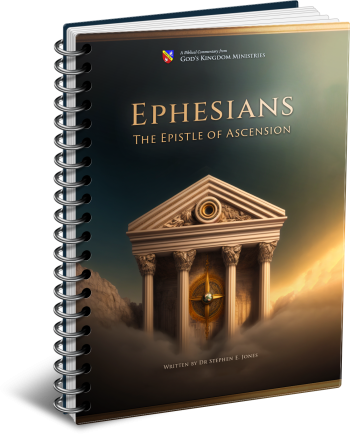Latest Posts
View the latest posts in an easy-to-read list format, with filtering options.

Paul's epistle to the Ephesians is, in some ways, a continuation of his epistle to the Romans. It enlarges upon Romans 1-8 in regard to the believer's position and right standing with God. We are "seated" with Christ, so we must "walk" according to our calling, and "stand" in the full armor of God against those who would oppose us.
Category - Bible Commentaries

The foundation of slavery is the Old Covenant. In our time, slavery is seen as an evil practice, mostly because men have abused the practice. Men with no understanding of the will of God have enslaved others for the purpose of enriching themselves. Even in so-called Christian nations, egregious abuses continued, because the church failed to teach the principles of the Old and New Covenants.
If these biblical principles had been taught (and enforced), the world would have been a much better place. Unfortunately, the church had already cast aside the law in favor of men’s traditions, so they were unable to establish freedom and liberty upon the sure foundation of the word of God. The law of God not only speaks into the issue of slavery, it regulates it. All of men’s slaves are first the slaves of God Himself. Hence, men are not authorized to mistreat their slaves.
As we will see, biblical slavery is a function of the Old Covenant, which is not evil in itself, but is designed to be a time for spiritual growth and learning so that one can come into freedom of the children of God. In other words, the Old Covenant is not a permanent state but is designed to bring us into the freedom of the New Covenant.
After giving instructions about family relationships, Paul writes in Eph. 6:5-8,
5 Slaves, be obedient to those who are your masters according to the flesh, with fear and trembling, in the sincerity of your heart, as to Christ; 6 not by way of eyeservice, as men-pleasers, but as slaves of Christ, doing the will of God from the heart. 7 With good will render service, as to the Lord, and not to men, 8 knowing that whatever good thing each one does, this he will receive back from the Lord, whether slave or free.
Here we see another application of an Old Covenant relationship in addition to husbands and wives or parents and children. There is also the authority of masters over slaves. It is clear that slavery is the condition of the bondwoman, “who is in slavery with her children” (Gal. 4:25). Hence, all slaves, by definition, function under this Old Covenant principle.
Even children, while they are yet minors, are like slaves, as Paul says in Gal. 4:1, 2,
1 Now I say, as long as the heir is a child, he does not differ at all from a slave, although he is owner of everything, 2 but he is under guardians and managers until the date set by the father.
The heir was not expected to remain a slave forever. His time of slavery was temporary, giving him time to grow and to learn to act responsibly, so that when he receives his inheritance, he does not squander it. Recall that the prodigal son in Jesus’ parable seemed to receive his inheritance before he had learned such responsibility, and he soon squandered his inheritance (Luke 15:13).
Just as children were to obey their parents, so also were slaves to obey their masters “with fear and trembling.” This was a Hebrew idiom for being respectful and obedient, so as to avoid a possible beating. Slaves did not have to tremble literally to fulfill this admonition.
Paul reminds slaves that they are actually God’s slaves first, so they ought to labor for their masters because they are “slaves of Christ.” Furthermore, slaves “will receive back from the Lord” rewards (wages) for their heart-felt service to Christ.
Too often, masters have used this instruction for their own benefit while ignoring the obvious fact that their slaves are to be respected and treated as God’s slaves first and foremost. Masters who claim authority have an equal level of responsibility to put on the mind of Christ and treat their slaves as Christ would treat them.
This is the way of godly leadership on every level.
The law of God demands restitution where men have stolen or who have destroyed the property of others. Exodus 22:3 says, “He shall surely make restitution; if he owns nothing, then he shall be sold for his theft.”
This is biblical slavery. If a man steals and is convicted properly in a court of law, he must pay double restitution (Exodus 22:4)—or, in some cases, four or five times the amount stolen. If he lacks the means to pay the prescribed restitution, then “he shall be sold for his theft.” In other words, he is sentenced to slavery for a specified amount of time.
We see, then, that slavery is not only authorized but demanded from thieves, in order that the victim might be compensated for his loss. This is biblical justice. Convicted thieves were not to be caged like animals. They were to undergo the discipline of a slave and work off their debt. The purpose of slavery was to teach thieves to do honest work. By accomplishing tasks or building useful things that they could be proud of, they could also build self-esteem.
Their master was expected to have the mind of Christ, knowing that these slaves were not to be treated as animals but respected as God’s slaves—God’s property—by right of creation. No master had the inherent right to destroy God’s property.
Further, the master was to keep in mind that his slave would be free at the end of his sentence. The man might then be his neighbor with full citizenship rights in God’s Kingdom. It was in the master’s best interest to instill in the thief a sense of pride in his work. Reforming the thief was to be the master’s work in building the Kingdom, as much as it was for a parent to raise children to be good citizens of the Kingdom.
Ideally, the master would be like Christ to his slave. How would Christ treat a slave? Would He not teach and train the slave in the laws and principles of the Kingdom? Christ has taken such responsibility for us all. Note how Christ often referred to His disciples as slaves (Matt. 25:14, 19, 21; Luke 12:38; 14:17; John 15:15). Paul himself was “a bond-servant of Christ Jesus” (Rom. 1:1).
The slave/servant relationship is based on the Old Covenant, and it is appropriate while we are yet in Christ’s discipleship training program. Toward the end of Christ’s ministry, Jesus told His disciples in John 15:14, 15, “You are My friends… No longer do I call you slaves.” While slaves are in an Old Covenant relationship, friends are peers who enjoy the freedom of a New Covenant relationship.
We achieve a New Covenant relationship because we have learned obedience to the law during our discipleship training. We are not set free to sin but to continue doing the will of God that we have learned during our training. In other words, we have learned the law, so that we know what sin is. Paul says in Rom. 3:20, “through the Law comes the knowledge of sin.” Again, he says in Rom. 7:7, “I would not have come to know sin except through the law.”
Once we have learned to know the law (i.e., the will of God), and once the law is written on our hearts so that righteousness is part of our nature, then we are His friends who are ready to be sent out as apostles with a New Covenant status or position.
Paul’s letter to Philemon is short and often ignored, but it provides us with a good example of biblical slavery. Philemon apparently was one of Paul’s converts in the church of Colossi, a man of means who had multiple slaves. One of those slaves, Onesimus, had escaped and had made his way to Rome, where he had met Paul during his first imprisonment in Rome (62 A.D.).
Onesimus was converted to Christ through Paul’s influence. Paul soon encouraged Onesimus to return to Philemon, carrying this letter asking his friend to treat Onesimus “no longer as a slave, but more than a slave, a beloved brother” (Phil. 16).
Paul also wrote his epistle to the Colossian church, sending both letters with Tychichus, who was accompanied by Onesimus, “our faithful and beloved brother” (Col. 4:9).
We see in this situation how Onesimus, after his conversion to Christ, was to be elevated from a mere slave to a brother in Christ. Essentially, Paul asked Philemon to treat him as a brother, knowing all the while that Philemon would do more than he asked (Phil. 21) and give his slave New Covenant status. Apparently, Paul had taught about biblical slavery during his ministry among the Colossians.
Paul also volunteered to pay for any damages or losses that Onesimus may have owed his master (Phil. 18). Hence, Paul volunteered to redeem Onesimus from debt-slavery, if such was appropriate, while reminding Philemon “that you owe to me even your own self as well” (Phil. 19).
No doubt he was referring to the fact that it was through Paul’s ministry that Philemon had been led to Christ, thereby showing him the way to be redeemed from his own slavery to sin.
All of this illustrates the principles of the Old and New Covenants and how they work in the practical life of the church and the world at large. It is only by studying the law and the covenants that we are able to appreciate fully his instruction to the church in Eph. 6:5-8, as well as his epistle to Philemon.